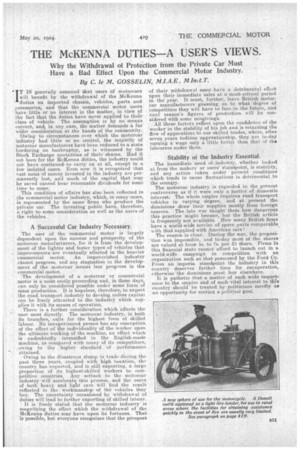THE McKENNA DUTIES—A USER'S VIEWS.
Page 15

If you've noticed an error in this article please click here to report it so we can fix it.
Why the Withdrawal of Protection from the Private Car Must Have a Bad Effect Upon the Commercial Motor Industry.
By C. le M. GOSSELIN,
I • T IS generally assumed that users of motorcars will benefit by the withdrawal of the McKenna duties on imported chassis, vehicles, parts and _accessories, and that the commercial motor users have little or no interest in the matter, in view of the fact that the duties have never applied to their ' Class of vehicle. The assumption is by no means correct, and, in any case, the matter demands a far wider consideration at the hands of the community.
Owing to circumstancesover which the motorcar industry had little or no control, the majority of motorcar manufacturers have been reduced to a state bordering on bankruptcy, as is witnessed by the Stock Exchatge quotations of their shares. Had it not been for the McKenna duties, the industry could. not have continuedto carry on at all, except in a few isolated cases. Even now it is recognized that vast sums of money invested in the industry are permanently lost, and much of the capital that may be saved cannot bear reasonable dividends for some time to come.
This condition of affairs has also been reflected in the commercial motor industry, which, in many cases, is represented by the same firms who produce the private car. The investing public have, therefore, a right to some consideration as well as the users of the vehicles.
A Successful Car Industry Necessary.
The user of the commercial motor is largely dependent upon the success and prosperity of the motorcar manufacturers, for it is from the development of the lighter and faster types of vehicles that improvements arc eventually effected in the heavier commercial motor. An impoverished industry cannot progress, and any stagnation in the development of the motorear means less progress in the commercial motor.
The development of a motorcar or commercial motor is a most costly proceeding and, in these days, can only be considered possible under some form of mass production. It is hopeless, therefore, to expect the road transport industry to develop_ unless capital can be freely attracted to the industrY which supplies it with its means of operation. There is a further consideration which affects the user most directly. The motorcar industry, in both its branches, calls for the highest form of skilled labour. No inexperienced person has any conception. of the effect of the individuality of the worker upon the ultimate working of the machine, an effect which is undoubtedly -intensified in the English-made machine, as compared with many of its competitors, .owing to the higher standard. 'of performanco attained.
Owing to the disastrous slump in trade 'during the past three years, coupled with high G.-oration, the country has exported, • and is still exporting, a .largc proportion of its highest-skilled workers to competitive countries. Any setback to the motorcar industry will .accelerate this process, and the users of both heavy and light cars will find the result reflected in the workmanship of the vehicles they buy. The uncertainty occasioned by withdrawal of duties will lead to further exporting of skilled labour. It is freely stated that the motorcar industryis magnifying the effect which the withdrawal of the McKenna duties may have upon its fortunes. That ispossible, but everyone recognizes that the prospect
of their withdrawal must have a detrimental effect upon their immediate sales at a most critical period in the year. It must, further, leave British motorcar manufacturers guessing as to what degree of competition they will have to face-in the future, and next season's figures of production will be considered with some misgivings. All these factors reflect upon the confidence of the worker in the stability of his job and is retarding the flow of apprentices to our skilled trades, where, after seven years tedious apprenticeship, they are to-day earning a wage only a little better than that of the labourers under them.
Stability of the Industry Essential.
The immediate need of industry, whether looked at from the makers' or users' standpoint, is stability, a-nd any action taken under present conditions which tends to cause fluctuations is detrimental to the country. The motorcar industry is regarded in the present controversy as if it were only a Matter of domestic interest: The whole empire requires road transport vehicles in varying degree, and at present the dominions draw their supplies mostly from foreign sources. The late war taught them how dangerous this practice might become, but the British article is frequently not available. How many British firms have a world-wide service of spare parts comparable with that supplied with American cars? The reason is clear. During the war, the proposi • tiori was impossible, and to-day most of the shares
• are valued at from es. to 7s. per 21 share. Firms in this financial state cannot 'afford to launch out in a world-wide campaign in competition with an organization such as that possessed by the Ford Co. From an imperia standpoint the industry in this country deserves further time for recuperation, otherwise thedominions must buy. elsewhere. It is pathetic that a matter of such wide import-i ance to the empire and ,of. such vital interest to this country should be treated by' politicians merely as an opportunity for scoring a political goal.






























